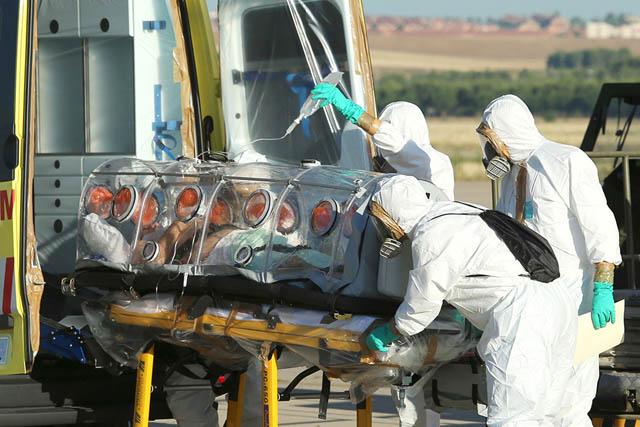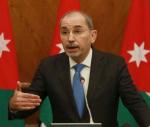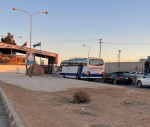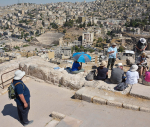You are here
US isolates troops, Australia imposes visa ban on Ebola-hit West African states
By Reuters - Oct 28,2014 - Last updated at Oct 28,2014
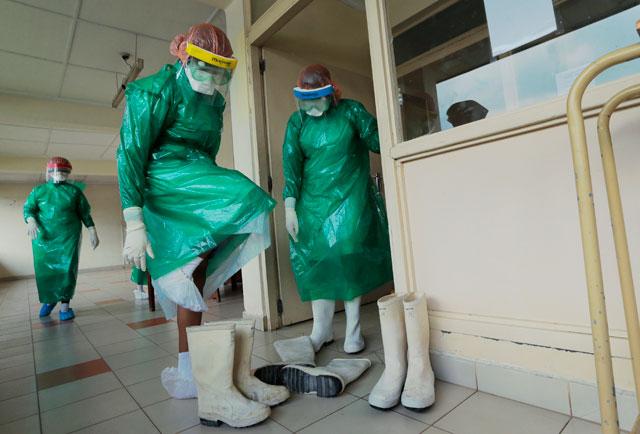
WASHINGTON/SYDNEY — The US military has isolated soldiers returning from an Ebola response mission in West Africa and Australia imposed a visa ban on the affected countries, policies that critics said would have little benefit but could feed a global panic.
Ebola has killed nearly 5,000 people since March, mostly in West Africa, but nine cases in the United States prompted states such as New York and New Jersey to ignore federal advice and quarantine all health workers returning from the region.
The United Nations criticised the US states' mandatory quarantine imposed on those returning from Liberia, Guinea and Sierra Leone.
"Returning health workers are exceptional people who are giving of themselves for humanity," Secretary General Ban Ki-moon's spokesman, Stephane Dujarric, said. "They should not be subjected to restrictions that are not based on science."
The World Health Organisation said it feared the quarantine measures could put people off volunteering to go to Africa.
"We desperately need international health workers ... They are really the key to this response," WHO spokesman Tarik Jasarevic said.
Australia is the first rich country to impose a visa ban on the three countries hit by Ebola, prompting anger across Africa.
"Western countries are creating mass panic which is unhelpful in containing a contagious disease like Ebola," said Ugandan government spokesman Ofwono Opondo.
"If they create mass panic... this fear will eventually spread beyond ordinary people to health workers or people who transport the sick and then what will happen? Entire populations will be wiped out."
Eighty-two people who had contact with a toddler who died of Ebola in Mali last week are being monitored, the WHO said, but no new cases have been reported there.
Mali became the sixth West African country to report a case of the disease. Senegal and Nigeria both stopped the virus by tracking down people who had had contact with the person who brought it into their country and monitoring them for symptoms.
Major general in isolation
NATO said it was talking with the United Nations about what help the Western military alliance might be able to provide.
"The question is not whether NATO allies are contributing in fighting Ebola. The question is whether this is best organised through a NATO structure, and that's too early to say," NATO Secretary General Jens Stoltenberg said.
American soldiers returning from West Africa are being isolated, even if they show no symptoms and are not believed to have been exposed to the virus.
Army said Chief of Staff General Raymond Odierno ordered the 21-day monitoring period "to ensure soldiers, family members and their surrounding communities are confident that we are taking all steps necessary to protect their health".
The army isolated about a dozen soldiers on their return during the weekend to their home base in Vicenza, Italy. That included Major General Darryl Williams, the commander of US Army Africa, who oversaw the military's initial response to the Ebola outbreak in West Africa.
"We are billeted in a separate area. There's no contact with the general population or with family. No one will be walking around Vicenza," Williams told Reuters in a telephone interview.
The US military has repeatedly stressed that its personnel are not interacting with Ebola patients and are instead building treatment units to help health authorities battle the epidemic. Up to 4,000 US troops may be deployed on the mission.
Dr Jeff Duchin, chairman of the public health committee of the Infectious Diseases Society of America, said the isolation was not a necessary step. "From a public health perspective, we would not feel that isolation is appropriate," he said.
The decision goes well beyond established military protocols and came as President Barack Obama's administration sought to discourage quarantines being imposed by some US states.
Dr Thomas Frieden, director of the US Centers for Disease Control and Prevention (CDC), called for isolation of people at the highest risk for Ebola infection but said most returning medical workers would require monitoring without isolation.
"At CDC, we base our decisions on science and experience... And as the science and experience changes, we adopt and adapt our guidelines and recommendations," Frieden said.
Australia has not recorded a case of Ebola despite a number of scares, and conservative Prime Minister Tony Abbott has so far resisted repeated requests to send medical personnel to help battle the outbreak on the ground.
Its decision to refuse entry for anyone from Sierra Leone, Guinea and Liberia, while touted by the government as a necessary safety precaution, was criticised by experts and advocates as politically motivated and shortsighted.
Adam Kamradt-Scott, of the University of Sydney's Marie Bashir Institute for Infectious Diseases and Biosecurity, said the ban would do nothing to protect the country from Ebola while potentially having a negative public health impact by creating a general climate of panic.
Medical professionals say Ebola is difficult to catch and is spread through direct contact with body fluids from an infected person and not transmitted by asymptomatic people. Ebola is not airborne.
"Anything that will dissuade foreign trained personnel from coming here to West Africa and joining us on the frontline to fight the fight would be very, very unfortunate," Anthony Banbury, head of the UN Ebola Emergency Response Mission, told Reuters in the Ghanian capital Accra.
He said that health workers returning to their own countries should be treated as heroes.
Related Articles
The US envoy to the United Nations criticised the level of international support for nations hit by Ebola as she began a tour Sunday of West African nations struggling with the disease.
The World Health Organisation authorised the use of experimental drugs in the fight against Ebola on Tuesday as the death toll topped 1,000 and a Spanish priest became the first European to succumb to the latest outbreak of the virus.
West African countries Sunday lamented the knock-on effects of their fight against the Ebola epidemic as restrictions snarled transport, causing food shortages and price hikes.



